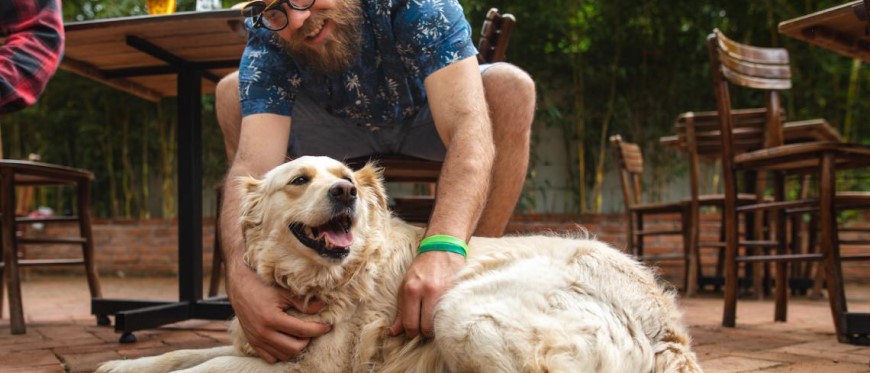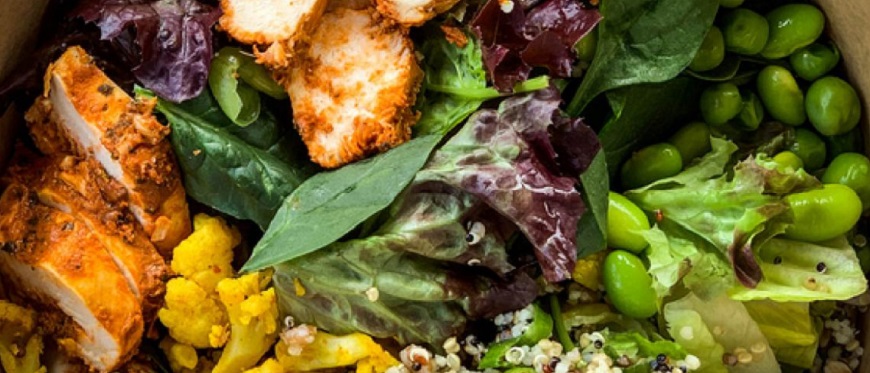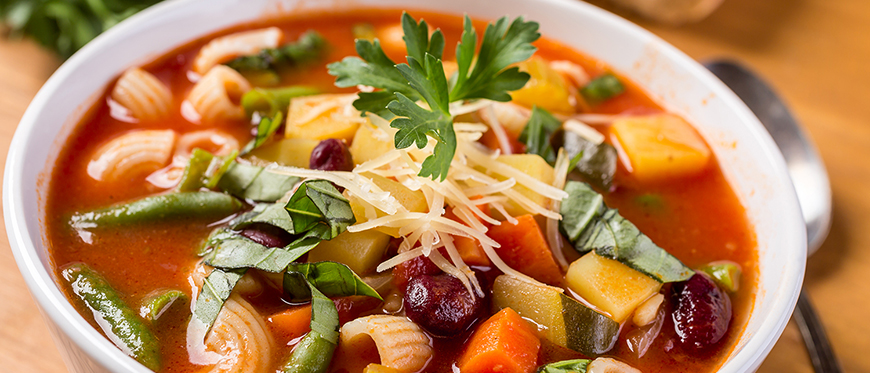Hot tips for eating healthy this season
When time away begins with a pre-dawn, pre-airport stop at the gas station buffet, or a humid evening tempts us to reach for a takeout menu rather than turn on the oven, we may give up on healthy eating during the summer.
“Summer eating,” says Kate Bean, a registered dietitian at The University of Vermont Health Network – Central Vermont Medical Center, “can be a hot mess.”
But, she quickly adds, “It’s also a fun mess.”
Bean’s colleague, Bridget Shea, a registered dietitian at The University of Vermont Health Network – University of Vermont Medical Center, agrees it would be a shame to ruin summer by being overly hard on ourselves about healthy eating.
“Any plan that would prevent you from going on vacation, or going camping, or enjoying a meal with your friends is not sustainable,” says Shea. “There’s no reason to not enjoy eating as a part of life. No dietitian would recommend that.”
Fortunately, these food pros have a handful of better recommendations, in the form of easy and helpful tips to help you enjoy the season in a healthy way.
Why can summer eating be so difficult?
“Summer can almost feel like the holiday season,” says Shea. “It’s really busy, and there’s lots of gathering around food. It’s also a less organized time for families because the kids are out of school, and anything out of the ordinary can make things more difficult.”
The season’s smorgasbord of barbecues, outings and camping trips can challenge us by disrupting our routines. But that needn’t completely sidetrack us from eating patterns that are both healthy and doable.
Tips for party eating
The main advice when at a party, says Bean, is to not overthink things. “Your goal should be to make yourself a balanced plate, rather than showing up at a party with a list of “don’ts” in your head.
- Eat what you want. Both experts emphasize that bringing an attitude of self-denial to a party will only go one way: badly. “Pick what you’re most looking forward to – whether that’s potato salad, strawberry shortcake or something else – and have a serving,” Bean says. Shea agrees: “You should eat what you want. If you don’t, you’ll just eat more of everything else to try to satisfy the craving.
- Have a cold beverage, says Bean. This can be seltzer, iced tea or water with a fresh lemon; it doesn’t have to be alcohol. Not only does staying hydrated make hunger less urgent, but having something to sip on also satisfies the urge to graze.
- Bring something healthy that you’ll feel good about eating. Plus, everyone likes a veggie platter and hummus, Bean adds.
- Distance yourself from the food. Survey the scene, choose what you like, and then take yourself and your food away from the trays of food. “If you’re standing or sitting right near the food, you’ll be more likely to eat mindlessly,” says Shea.
Vacation salvation
Many of us worry that we’ll come home from vacation with a few extra pounds as souvenirs. But, says Shea, that worry is usually misplaced. “When you’re on vacation, you tend to be more active than you are at home. The vacation itself isn’t usually a problem when it comes to weight gain.” The real challenge, she says, more often arises when you come home to an empty fridge, and it takes you a few days to get back into your normal routine.
- When you’re on a trip enjoy yourself. If you’re exploring a new place, take time to taste the unique foods in that city or culture. “There’s all this different food to experience, and that’s a good thing. That’s part of traveling,” says Shea.
- Work in healthy choices, even if your AirB&B pantry has to come from a convenience store. If you’re picking up snacks, grab some yogurt, cottage cheese or nuts to add some variety to the carbs.
- Before you leave for vacation, set yourself up for re-entry success by stocking your fridge and pantry with healthy foods that will still be fresh when you return. For example, Shea suggests canned beans and tuna, frozen lean meats and whole grain bread. Unopened containers of hummus and yogurt, as well as sturdy fruits and vegetables like apples, carrots and celery, should last in your fridge for several weeks.
Pack a (healthy) cooler
When you’re going on a camping trip, pack and prepare a variety of foods – healthy choices as well as guilty pleasures. “No one wants to eat meat and chips the whole weekend. People are happy to have healthier foods too,” says Shea. The key is making the healthy choices as easy as the chips.
- Produce actually travels quite well, both experts say, so don’t leave fruits and veggies at home.
- Put it out. “Don’t let your good intentions stop with the packing,” says Shea. “If you put it out, they will eat it – whether that’s veggies and fruit, or chips and s’mores.”
- Prep ahead of time. Wash and chop things at home to make fruits and veggies ready to grab. Prep green salads or bean salads ahead and put them in plastic bags.
Good fuel for summer activities
If you’re heading out on a hike or a bike ride, it’s tempting to fill the backpacks with bottled “ades” and energy bars. But there are healthier ways to fuel your body for summer fun, say Shea and Bean.
- Have a good solid meal or smoothie before you head out.
- Take along healthy snacks like cheese, jerky, PB&J and trail mix or “GORP” (Good Old Raisins and Peanuts).
- Think fruit. It’s a great choice to satisfy both hunger and thirst. “Fruit is really hydrating,” says Shea, and watermelon and grapes, in particular, are good summer travelers.
- Hydration drinks aren’t necessary. “People overdo it with the hydration drinks. For most people, plain water does the job, without all that extra sugar,” she says
Too hot to cook?
The oven isn’t your only option. Remember that you have other tools at your disposal.
- Use the grill, microwave, rice cooker, instant pot or slow cooker. “We think about a slow cooker as a winter thing, but it’s an amazing way to not have to cook when you get home and it’s 80 degrees,” says Bean.
- Have veggies and salads. “People think that eating healthy means needing to follow a recipe. But summer is a great time to just chop up tomatoes and not have to do much to them,” says Shea, who reminds us to enjoy the great flavors of the season’s fresh produce.
- Cook in bulk in the morning, before it gets hot. Shea acknowledges that “The idea of ‘food prep’ can seem kind of overwhelming. For me, it’s just about making extra of something, but with intention.” For example, if she’s grilling chicken breasts for one meal, she’ll often toss a few extra portions on the barbecue and stash them in the fridge for wraps or a salad later in the week. Or if she’s making a batch of brown rice or whole grain pasta, she chills the extra servings to add fiber and nutrients to salads throughout the week.
Easy does it
Both experts stress that healthy eating practices don’t have to take the joy out of summer fun. They encourage you to be gentle on yourself, and still give yourself permission to enjoy the foods you love, even if they’re not the “healthiest” choices.
- A healthy diet is a lot more moderate and forgiving than people think. “You don’t need to never have a hot dog again, just maybe don’t have them at every single barbecue,” Bean advises. An eating plan that’s too strict is one you won’t stick to.
- “One meal isn’t going to make or break you,” she adds. “It’s about patience and consistency. Keep it simple and be kind to yourself.”





